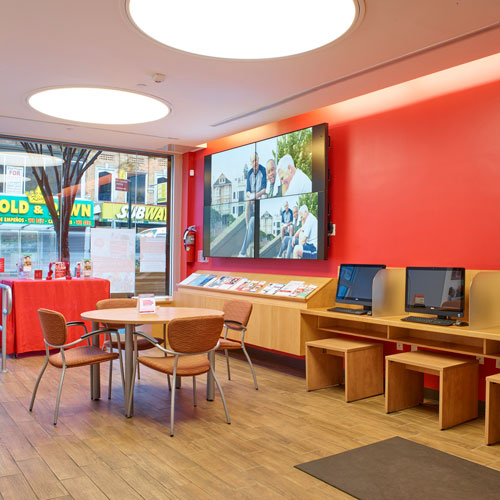Working for a worldwide conglomerate such as the Maersk Group—which operates in more than 130 countries, has more than 89,000 employees, and has about 700 properties in its portfolio—a daily call sheet most likely will include meetings with people from several continents. For Allan Kehlet Rieck, head of corporate real estate management for the Denmark-based company, his workplace has no borders.
“On a typical day, I am dealing with people from all over the world,” he says. “In the morning, after I hand off my kids to school, I focus on Asia and talk to my people in Shanghai and the Asia Pacific. In the middle of the day, I am on the phone with India to our office in Mumbai, then Europe, Africa, and the Middle East. Later in the afternoon and evenings, I am talking with the Americas.”
Rieck has been with the Maersk Group for seven years, and before that he had a long tenure in procurement and negotiations, including stints in South Africa and Charlotte, North Carolina.
“Before that I was in banking,” he says. “All my life has been surrounded by negotiations and deals and optimization.”
Reducing the Portfolio
As part of his responsibilities, Rieck recently had to determine a way to reduce Maersk’s property portfolio by 20 percent. Rather than simply comply with company wishes, he got creative.
“The situation was our financial people challenged us to cut back and reduce our footprint,” Rieck explains. “We ended up debating this and striking a deal so we would reduce individual space by 20 percent, but I wanted 10 percent of the reduction back for the people. We reduced desk sizes and personal space, and added collaborative spaces and made a better overall workplace environment.”

In the past three years, the team ended up reducing the footprint by 14.7 percent, while increasing user satisfaction by 24 percent thanks to an increase in the quality of available space.
Recent projects included office consolidation in Copenhagen, Denmark, The Woodlands, Texas, Charlotte, North Carolina, and Madison, New Jersey. For the latter, the company’s three-story, 147,000-square-foot headquarters at Giralda Farms proved to be historically significant to many of the higher-ups. Shipping magnate Mærsk McKinney Møller, the former CEO and chairman who led Maersk for 40 years and passed away in 2012, had personally played a role in selecting the site, so saying goodbye wasn’t an easy decision.
“For 25 years, it was the heart of our North American operations and all our executives worked there, and everybody—from stakeholders to the higher ups—all had an opinion on the property,” Rieck says. “We had to first find a tenant, then secure our new office, do the fit-out, and then sell the trophy property well—and we did all this within 10 months.”
The building sold for $53.3 million in a unique “negotiauction” process (see page 106) and Maersk’s New Jersey operations moved into a smaller space that had 80,000 square feet of Class A office space in Florham Park.
Although not desperate to sell The Woodlands property, the company has undertaken a strategic direction in which it wants to focus more attention on shipping and energy. As a result, Maersk is divesting itself of a sizable property portfolio.
“We have sold 23 properties around the world in the last five years, including a number of offices in the US,” Rieck says. “What’s really remarkable about the journey and what’s interesting in having sold so many properties worldwide, is we started seeing some patterns, and one that doesn’t make us too comfortable, questioning if deals we were getting in different markets were good enough.”
A Team Approach
Keeping tabs on such a vast global portfolio isn’t easy, but Rieck credits his team with making the job much less challenging and allowing him to do his job from Denmark most of the time. Although he says he “could travel every day,” he tries to limit himself to about 50 days on the road.

“I have a great team and that’s been a blessing for me,” he says. “People are very dependable, driven, and I don’t need to babysit. Often, I just try to encourage them and back them up, and give them a little coaching. Nobody gets motived by being micromanaged, anyhow.”
Although the job does allow employees to work from home with permission, Rieck prefers that his staff come to the office most days because he believes there’s great value in being all together under one roof.
“An office environment is important because it is a platform for collaboration, knowledge sharing, i.e. better performance and efficiencies,” he says. “We feel people want to come to work here. We have great food, an engaging environment, social camaraderie, and it’s my job to make people want to be here and feel good.”
Out of the Box Leadership
Not one to shy away from innovative ideas, Rieck recently switched jobs with a head of corporate real estate from a German company (from a different industry) for a week in an experiment he deems a great success.
“Our agreement was to identify three work behaviors that we could implement back to our own company and come up with three things that could add to the other’s team,” he shares. “It was very useful and impactful, and my team though it was great to have a new boss for a week with different questions and feedback. It goes back to my belief to always be knowledge sharing and driving to get better.”
Change Coming To Denmark
The Maersk Group’s hometown is Copenhagen, where it employs 4,200 office workers throughout 15 locations. Rieck says having that many offices is not efficient, however, so Maersk now is developing a new, modern, office in order to consolidate several smaller sites by 2017.
“It’s a very efficient building, it features solar panels and many sustainable measures,” Rieck says. “There will be lots of daylight and efficient workspaces for all employees.”
In Rieck’s opinion, his primary job is ensuring that the company’s 50,000 office workers have a great environment in which to work.
“We really do believe the work environment has an impact on the outcome and performance of our people,” he says. “We want it to be a place people feel at home.”
The Art of the Negotiauction
While the Maersk Group was divesting properties, it occurred to Rieck that there wasn’t enough evidence that the deals being made were “picture perfect.” He wanted to find a way to do things better.
That led to the company employing “negotiauctions,” which bring together auction theory and negotiation theory in a practical and accessible way.
“Time is important, but not the only driver for us,” Rieck says. “We wanted to be efficient but didn’t want to compromise on sales values, either. We found we could combine those things when benefiting from digitalization.”
Negotiauctions combine the traditional face-to-face negotiations and dialogue with a more modern, digital auction format. Although it’s not uncomplicated, Rieck says the output has been phenomenal and the company has been able to beat valuations by as much as 20 percent, even breaking some market records in the process.
The process leads to better efficiency, Rieck says, because it eliminates distrust in terms of investors who fear only being used as leverage, who might make better offers, and just how many “best and final offer” rounds actually will occur.
“What we find is that our process compresses the time and makes negotiations more efficient than the most skilled and most seasoned negotiator can possibly be,” he says. “Maersk has very high ethical standards and our core values means that we want to sure everyone gets treated with respect … Everyone has last option/last call because it keeps going until we have a winner—and the right investor gets the property at a price he is willing to pay—while we as sellers have evidence and documentation for the deal being perfectly straight.”



